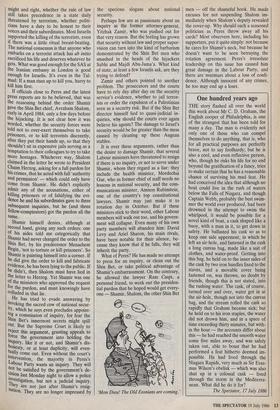One hundred years ago
THE story flashed all over the world this week about Mr C. D. Graham, the English cooper of Philadelphia, is one of the strangest that has been told for many a day. The man is evidently not only one of those who can compel themselves to do anything, that is, who for all practical purposes are perfectly brave, not to say foolhardy; but he is also a cool, and even reflective person, who, though he risks his life for no end beyond the gratification of a fancy, tries to make certain that he has a reasonable chance of surviving his mad feat. He had conceived the idea that although no boat could live in the rush of waters below the Falls of Niagara, and though Captain Webb, probably the best swim- mer the world ever produced, had been drowned in the attempt to swim the whirlpool, it would be possible for a novel kind of boat, a cask shaped like a buoy, with a man in it, to get down in safety. He ballasted his cask so as to keep one side uppermost, in which he left an air-hole, andiastened in the cask a long canvas bag, made like a suit of clothes, and water-proof. Getting into this bag, he held on to the inner sides of the cask by two iron handles fixed to the staves, and a movable cover being fastened on, was thrown, no doubt by friends, though this is not stated, into the rushing water. The cask, of course, turned over and over, water got in at the air-hole, though not into the canvas bag, and the stream rolled the cask so rapidly that Graham became sick; but he held on to his iron staples, the water did not drown him, and in a space of time exceeding thirty minutes, but with- in the hour — the accounts differ about this --- he had reached the smooth water some five miles away, and was safely taken out, able to boast that he had performed a feat hitherto deemed im- possible. He had lived through the Niagara Rapids, very much as Sir Eras- mus Wilson's obelisk — which was also shut up in a colossal cask — lived through the storm in the Mediterra- nean. What did he do it for?
The Spectator, 17 July 1886


















































 Previous page
Previous page